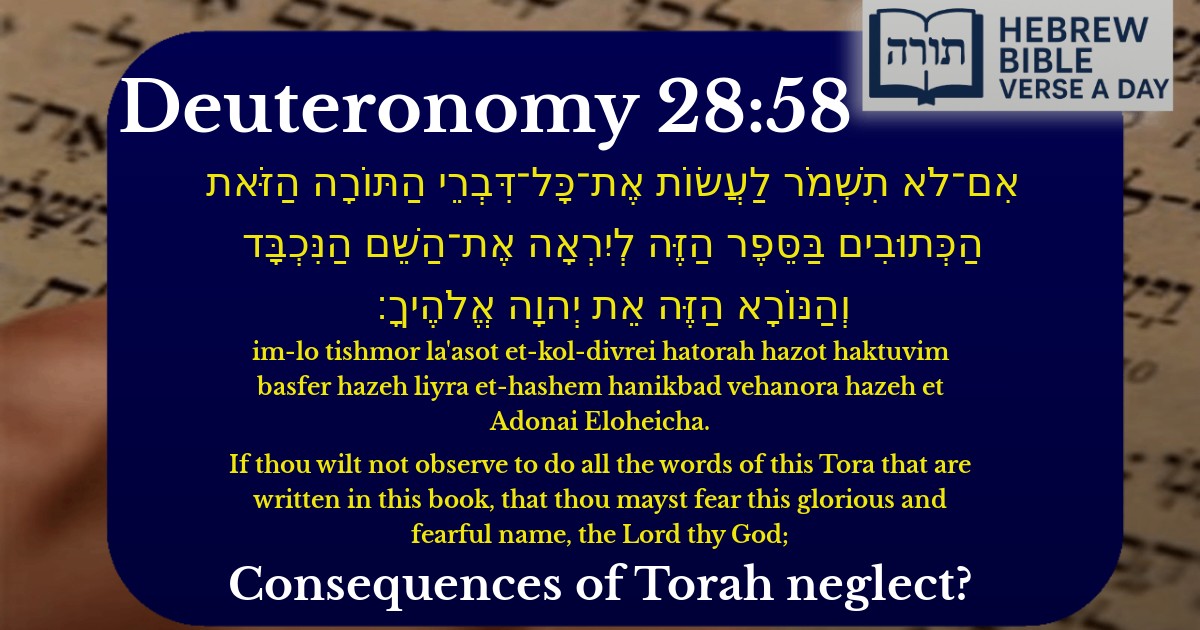Join Our Newsletter To Be Informed When New Videos Are Posted
Join the thousands of fellow Studends who rely on our videos to learn how to read the bible in Hebrew for free!
Hebrew Text
אִם־לֹא תִשְׁמֹר לַעֲשׂוֹת אֶת־כָּל־דִּבְרֵי הַתּוֹרָה הַזֹּאת הַכְּתוּבִים בַּסֵּפֶר הַזֶּה לְיִרְאָה אֶת־הַשֵּׁם הַנִּכְבָּד וְהַנּוֹרָא הַזֶּה אֵת יְהוָה אֱלֹהֶיךָ׃
English Translation
If thou wilt not observe to do all the words of this Tora that are written in this book, that thou mayst fear this glorious and fearful name, the Lord thy God;
Transliteration
Im-lo tishmor la'asot et-kol-divrei hatorah hazot haktuvim basfer hazeh liyra et-hashem hanikbad vehanora hazeh et Adonai Eloheicha.
Hebrew Leining Text
אִם־לֹ֨א תִשְׁמֹ֜ר לַעֲשׂ֗וֹת אֶת־כׇּל־דִּבְרֵי֙ הַתּוֹרָ֣ה הַזֹּ֔את הַכְּתֻבִ֖ים בַּסֵּ֣פֶר הַזֶּ֑ה לְ֠יִרְאָ֠ה אֶת־הַשֵּׁ֞ם הַנִּכְבָּ֤ד וְהַנּוֹרָא֙ הַזֶּ֔ה אֵ֖ת יְהֹוָ֥ה אֱלֹהֶֽיךָ׃
אִם־לֹ֨א תִשְׁמֹ֜ר לַעֲשׂ֗וֹת אֶת־כׇּל־דִּבְרֵי֙ הַתּוֹרָ֣ה הַזֹּ֔את הַכְּתֻבִ֖ים בַּסֵּ֣פֶר הַזֶּ֑ה לְ֠יִרְאָ֠ה אֶת־הַשֵּׁ֞ם הַנִּכְבָּ֤ד וְהַנּוֹרָא֙ הַזֶּ֔ה אֵ֖ת יְהֹוָ֥ה אֱלֹהֶֽיךָ׃
🎵 Listen to leining
Parasha Commentary
📚 Talmud Citations
This verse is not quoted in the Talmud.


Context in Sefer Devarim
This verse appears in Devarim 28:58, within the section of the Tochacha (rebuke), where Moshe warns Bnei Yisrael of the consequences of failing to observe the Torah. The emphasis is on the seriousness of fulfilling all mitzvot and maintaining proper yirat Shamayim (fear of Heaven).
Rashi's Explanation
Rashi comments that the phrase "לְיִרְאָה אֶת־הַשֵּׁם" ("to fear the Name") teaches that the ultimate purpose of Torah observance is to cultivate awe of Hashem. He notes that the Torah is not merely a set of rituals but a means to develop a deep, reverential relationship with the Divine.
Rambam on Yirat Hashem
In Hilchot Yesodei HaTorah (2:1-2), Rambam explains that fearing Hashem is a fundamental mitzvah, preceding even the study of Torah. The verse underscores that Torah observance must be coupled with sincere reverence—otherwise, it becomes mechanical and devoid of its true purpose.
Midrashic Insights
Practical Implications
The verse serves as a reminder that Torah observance must be holistic—not selective—and always accompanied by yirah. The Vilna Gaon teaches that fear of Hashem is the "container" (kli) that holds all mitzvot; without it, the "light" of Torah cannot endure.